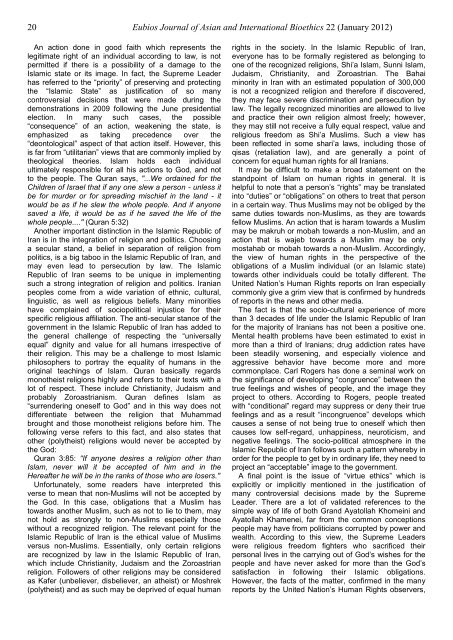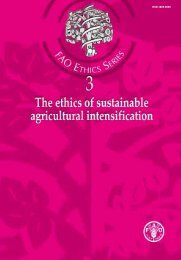Eubios Journal of Asian and International Bioethics - Eubios Ethics ...
Eubios Journal of Asian and International Bioethics - Eubios Ethics ...
Eubios Journal of Asian and International Bioethics - Eubios Ethics ...
You also want an ePaper? Increase the reach of your titles
YUMPU automatically turns print PDFs into web optimized ePapers that Google loves.
20 <strong>Eubios</strong> <strong>Journal</strong> <strong>of</strong> <strong>Asian</strong> <strong>and</strong> <strong>International</strong> <strong>Bioethics</strong> 22 (January 2012)<br />
An action done in good faith which represents the<br />
legitimate right <strong>of</strong> an individual according to law, is not<br />
permitted if there is a possibility <strong>of</strong> a damage to the<br />
Islamic state or its image. In fact, the Supreme Leader<br />
has referred to the “priority” <strong>of</strong> preserving <strong>and</strong> protecting<br />
the “Islamic State” as justification <strong>of</strong> so many<br />
controversial decisions that were made during the<br />
demonstrations in 2009 following the June presidential<br />
election. In many such cases, the possible<br />
“consequence” <strong>of</strong> an action, weakening the state, is<br />
emphasized as taking precedence over the<br />
“deontological” aspect <strong>of</strong> that action itself. However, this<br />
is far from “utilitarian” views that are commonly implied by<br />
theological theories. Islam holds each individual<br />
ultimately responsible for all his actions to God, <strong>and</strong> not<br />
to the people. The Quran says, "...We ordained for the<br />
Children <strong>of</strong> Israel that if any one slew a person - unless it<br />
be for murder or for spreading mischief in the l<strong>and</strong> - it<br />
would be as if he slew the whole people. And if anyone<br />
saved a life, it would be as if he saved the life <strong>of</strong> the<br />
whole people...." (Quran 5:32)<br />
Another important distinction in the Islamic Republic <strong>of</strong><br />
Iran is in the integration <strong>of</strong> religion <strong>and</strong> politics. Choosing<br />
a secular st<strong>and</strong>, a belief in separation <strong>of</strong> religion from<br />
politics, is a big taboo in the Islamic Republic <strong>of</strong> Iran, <strong>and</strong><br />
may even lead to persecution by law. The Islamic<br />
Republic <strong>of</strong> Iran seems to be unique in implementing<br />
such a strong integration <strong>of</strong> religion <strong>and</strong> politics. Iranian<br />
peoples come from a wide variation <strong>of</strong> ethnic, cultural,<br />
linguistic, as well as religious beliefs. Many minorities<br />
have complained <strong>of</strong> sociopolitical injustice for their<br />
specific religious affiliation. The anti-secular stance <strong>of</strong> the<br />
government in the Islamic Republic <strong>of</strong> Iran has added to<br />
the general challenge <strong>of</strong> respecting the “universally<br />
equal” dignity <strong>and</strong> value for all humans irrespective <strong>of</strong><br />
their religion. This may be a challenge to most Islamic<br />
philosophers to portray the equality <strong>of</strong> humans in the<br />
original teachings <strong>of</strong> Islam. Quran basically regards<br />
monotheist religions highly <strong>and</strong> refers to their texts with a<br />
lot <strong>of</strong> respect. These include Christianity, Judaism <strong>and</strong><br />
probably Zoroastrianism. Quran defines Islam as<br />
“surrendering oneself to God” <strong>and</strong> in this way does not<br />
differentiate between the religion that Muhammad<br />
brought <strong>and</strong> those monotheist religions before him. The<br />
following verse refers to this fact, <strong>and</strong> also states that<br />
other (polytheist) religions would never be accepted by<br />
the God:<br />
Quran 3:85: “If anyone desires a religion other than<br />
Islam, never will it be accepted <strong>of</strong> him <strong>and</strong> in the<br />
Hereafter he will be in the ranks <strong>of</strong> those who are losers."<br />
Unfortunately, some readers have interpreted this<br />
verse to mean that non-Muslims will not be accepted by<br />
the God. In this case, obligations that a Muslim has<br />
towards another Muslim, such as not to lie to them, may<br />
not hold as strongly to non-Muslims especially those<br />
without a recognized religion. The relevant point for the<br />
Islamic Republic <strong>of</strong> Iran is the ethical value <strong>of</strong> Muslims<br />
versus non-Muslims. Essentially, only certain religions<br />
are recognized by law in the Islamic Republic <strong>of</strong> Iran,<br />
which include Christianity, Judaism <strong>and</strong> the Zoroastrian<br />
religion. Followers <strong>of</strong> other religions may be considered<br />
as Kafer (unbeliever, disbeliever, an atheist) or Moshrek<br />
(polytheist) <strong>and</strong> as such may be deprived <strong>of</strong> equal human<br />
rights in the society. In the Islamic Republic <strong>of</strong> Iran,<br />
everyone has to be formally registered as belonging to<br />
one <strong>of</strong> the recognized religions, Shi’a Islam, Sunni Islam,<br />
Judaism, Christianity, <strong>and</strong> Zoroastrian. The Bahai<br />
minority in Iran with an estimated population <strong>of</strong> 300,000<br />
is not a recognized religion <strong>and</strong> therefore if discovered,<br />
they may face severe discrimination <strong>and</strong> persecution by<br />
law. The legally recognized minorities are allowed to live<br />
<strong>and</strong> practice their own religion almost freely; however,<br />
they may still not receive a fully equal respect, value <strong>and</strong><br />
religious freedom as Shi’a Muslims. Such a view has<br />
been reflected in some shari’a laws, including those <strong>of</strong><br />
qisas (retaliation law), <strong>and</strong> are generally a point <strong>of</strong><br />
concern for equal human rights for all Iranians.<br />
It may be difficult to make a broad statement on the<br />
st<strong>and</strong>point <strong>of</strong> Islam on human rights in general. It is<br />
helpful to note that a person’s “rights” may be translated<br />
into “duties” or “obligations” on others to treat that person<br />
in a certain way. Thus Muslims may not be obliged by the<br />
same duties towards non-Muslims, as they are towards<br />
fellow Muslims. An action that is haram towards a Muslim<br />
may be makruh or mobah towards a non-Muslim, <strong>and</strong> an<br />
action that is wajeb towards a Muslim may be only<br />
mostahab or mobah towards a non-Muslim. Accordingly,<br />
the view <strong>of</strong> human rights in the perspective <strong>of</strong> the<br />
obligations <strong>of</strong> a Muslim individual (or an Islamic state)<br />
towards other individuals could be totally different. The<br />
United Nation’s Human Rights reports on Iran especially<br />
commonly give a grim view that is confirmed by hundreds<br />
<strong>of</strong> reports in the news <strong>and</strong> other media.<br />
The fact is that the socio-cultural experience <strong>of</strong> more<br />
than 3 decades <strong>of</strong> life under the Islamic Republic <strong>of</strong> Iran<br />
for the majority <strong>of</strong> Iranians has not been a positive one.<br />
Mental health problems have been estimated to exist in<br />
more than a third <strong>of</strong> Iranians; drug addiction rates have<br />
been steadily worsening, <strong>and</strong> especially violence <strong>and</strong><br />
aggressive behavior have become more <strong>and</strong> more<br />
commonplace. Carl Rogers has done a seminal work on<br />
the significance <strong>of</strong> developing “congruence” between the<br />
true feelings <strong>and</strong> wishes <strong>of</strong> people, <strong>and</strong> the image they<br />
project to others. According to Rogers, people treated<br />
with “conditional” regard may suppress or deny their true<br />
feelings <strong>and</strong> as a result “incongruence” develops which<br />
causes a sense <strong>of</strong> not being true to oneself which then<br />
causes low self-regard, unhappiness, neuroticism, <strong>and</strong><br />
negative feelings. The socio-political atmosphere in the<br />
Islamic Republic <strong>of</strong> Iran follows such a pattern whereby in<br />
order for the people to get by in ordinary life, they need to<br />
project an “acceptable” image to the government.<br />
A final point is the issue <strong>of</strong> “virtue ethics” which is<br />
explicitly or implicitly mentioned in the justification <strong>of</strong><br />
many controversial decisions made by the Supreme<br />
Leader. There are a lot <strong>of</strong> validated references to the<br />
simple way <strong>of</strong> life <strong>of</strong> both Gr<strong>and</strong> Ayatollah Khomeini <strong>and</strong><br />
Ayatollah Khamenei, far from the common conceptions<br />
people may have from politicians corrupted by power <strong>and</strong><br />
wealth. According to this view, the Supreme Leaders<br />
were religious freedom fighters who sacrificed their<br />
personal lives in the carrying out <strong>of</strong> God’s wishes for the<br />
people <strong>and</strong> have never asked for more than the God’s<br />
satisfaction in following their Islamic obligations.<br />
However, the facts <strong>of</strong> the matter, confirmed in the many<br />
reports by the United Nation’s Human Rights observers,

















